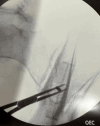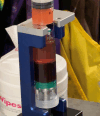Evidence-Based Clinical Practice Guidelines on Regenerative Medicine Treatment for Chronic Pain: A Consensus Report from a Multispecialty Working Group
- PMID: 39282657
- PMCID: PMC11402349
- DOI: 10.2147/JPR.S480559
Evidence-Based Clinical Practice Guidelines on Regenerative Medicine Treatment for Chronic Pain: A Consensus Report from a Multispecialty Working Group
Abstract
Purpose: Injectable biologics have not only been described and developed to treat dermal wounds, cardiovascular disease, and cancer, but have also been reported to treat chronic pain conditions. Despite emerging evidence supporting regenerative medicine therapy for pain, many aspects remain controversial.
Methods: The American Society of Pain and Neuroscience (ASPN) identified the educational need for an evidence-based guideline on regenerative medicine therapy for chronic pain. The executive board nominated experts spanning multiple specialties including anesthesiology, physical medicine and rehabilitation, and sports medicine based on expertise, publications, research, and clinical practice. A steering committee selected preliminary questions, which were reviewed and refined. Evidence was appraised using the United States Preventive Services Task Force (USPSTF) criteria for evidence level and degree of recommendation. Using a modified Delphi approach, consensus points were distributed to all collaborators and each collaborator voted on each point. If collaborators provided a decision of "disagree" or "abstain", they were invited to provide a rationale in a non-blinded fashion to the committee chair, who incorporated the respective comments and distributed revised versions to the committee until consensus was achieved.
Results: Sixteen questions were selected for guideline development. Questions that were addressed included type of injectable biologics and mechanism, evidence in treating chronic pain indications (eg, tendinopathy, muscular pathology, osteoarthritis, intervertebral disc disease, neuropathic pain), role in surgical augmentation, dosing, comparative efficacy between injectable biologics, peri-procedural practices to optimize therapeutic response and quality of injectate, federal regulations, and complications with mitigating strategies.
Conclusion: In well-selected individuals with certain chronic pain indications, use of injectable biologics may provide superior analgesia, functionality, and/or quality of life compared to conventional medical management or placebo. Future high-quality randomized clinical trials are warranted with implementation of minimum reporting standards, standardization of preparation protocols, investigation of dose-response associations, and comparative analysis between different injectable biologics.
Keywords: bone marrow aspirate concentrate; injectable biologics; mesenchymal stem cell; pain medicine; platelet-rich plasma; regenerative medicine.
© 2024 D’Souza et al.
Conflict of interest statement
RSD received investigator-initiated research grant funding from Nevro Corp and Saol Therapeutics paid to his institution. MES is a research consultant for Apurano, outside the submitted work. AKC is a consultant for Medtronic, Companion Spine, PainTeq, and Vertos; a speaker for Relievant; and receives research support from Medtronic, Nevro Corp, Stryker, Boston Scientific, Spine Biopharma, Biorestorative, Vivex, Vertos, DiscGenics, ReGelTec, Saol Therapeutics, PainTeq, Saluda, and Relievant. SGP is a consultant for Bioness, SPR Therapeutics, Nalu Medical, Medtronic; receives royalties from Oxford University Press and Wolters Kluwer; and receives research grant funding from Medtronic, Nevro Corp, Abbott, and Biotronik. CC is a shareholder and patent holder and chief medical officer of Regenexx LLC. SAS is on the board of directors for The Biologic Association (non-profit). YE is a research consultant for Autonomous Healthcare Inc, is on the advisory board for Saluda Medical Americas Inc and SPR Therapeutics. DS is a consultant to Abbott, Painteq, Saluda, Mainstay, Surgentec, Nevro, and holds stock options with Painteq, Neuralace, Mainstay, Vertos, and SPR Therapeutics. SD serves on the advisory board for CornerLoc. TRD is a consultant for Abbott, Vertos, SpineThera, Saluda Medical, Cornerloc, SPR Therapeutics, PainTeq, Spinal Simplicity, Aurora and Biotronik; he is an advisory board member for Abbott, Vertos, SPR Therapeutics, and Biotronik; he has a DRG Lead patent that is pending with Abbott; he has funded research with Abbott, Vertos, Saluda, Mainstay, SPR Therapeutic, Boston Scientific, and PainTeq. The authors report no other conflicts of interest in this work.
Figures




References
-
- DeChellis DM, Cortazzo MH. Regenerative medicine in the field of pain medicine: prolotherapy, platelet-rich plasma therapy, and stem cell therapy—Theory and evidence. Tech Reg Anesthesia Pain Manage. 2011;15(2):74–80.

